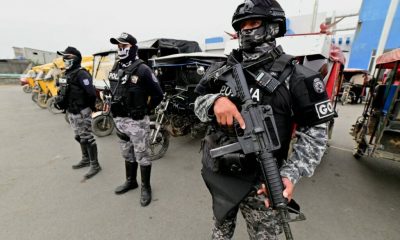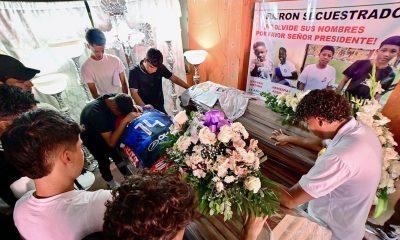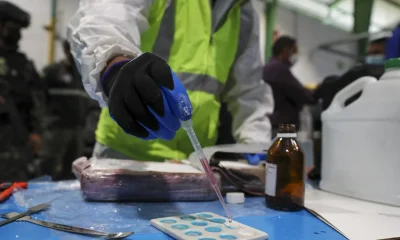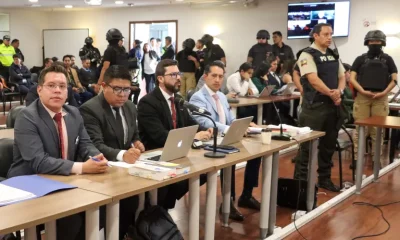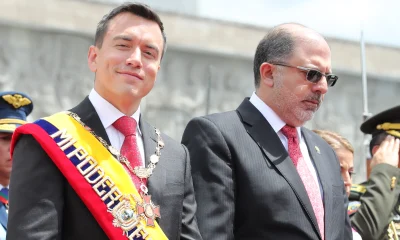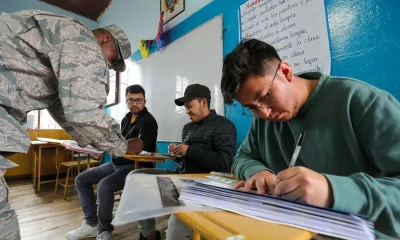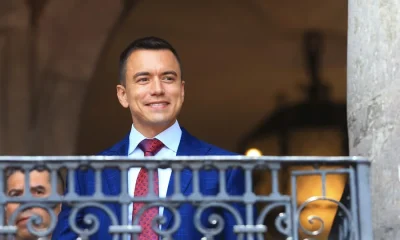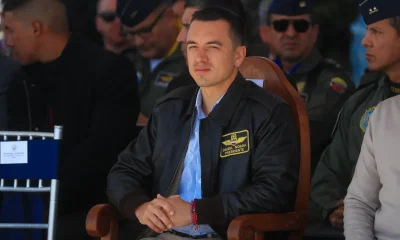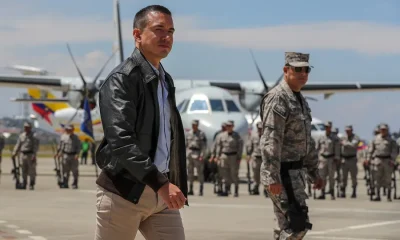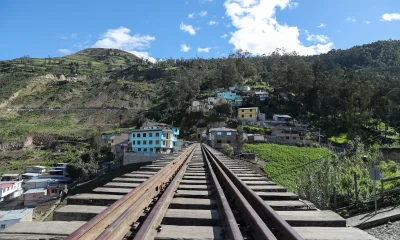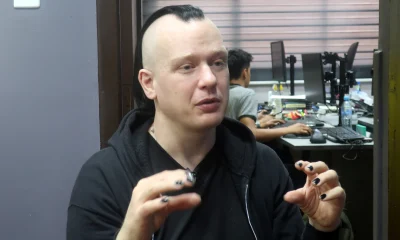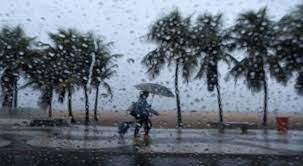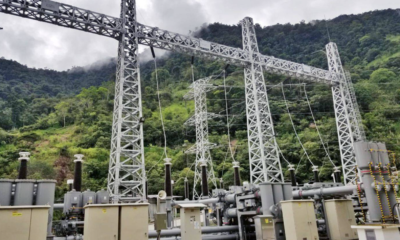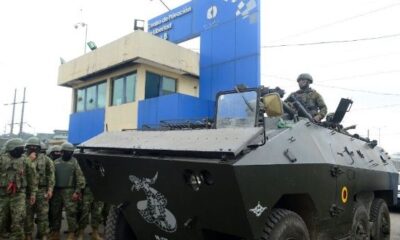International
Ecuador declares the Mexican ambassador persona “non grata” by comment by López Obrador
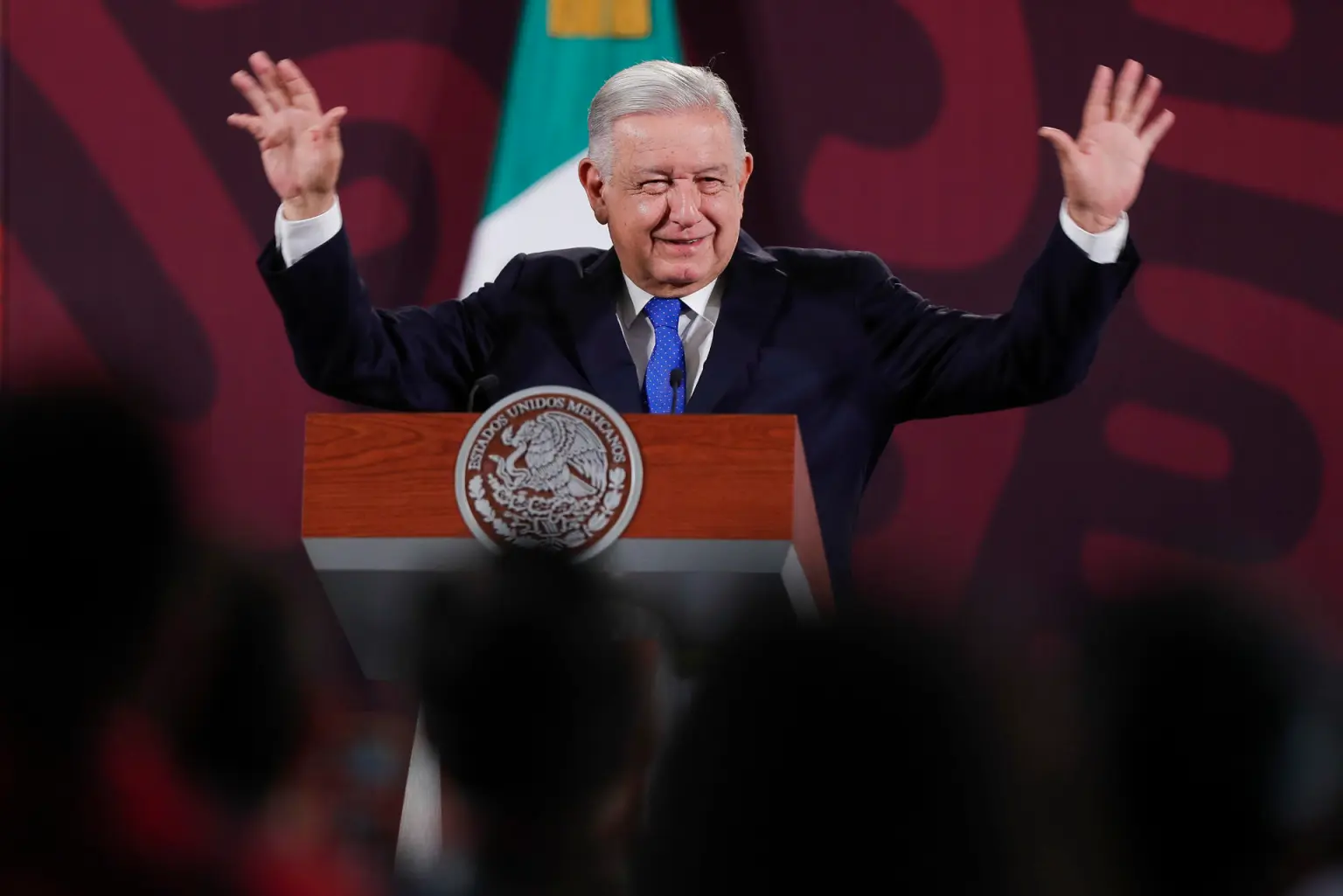
The Government of Ecuador announced that it decided to declare the Mexican ambassador in Quito, Raquel Serur, persona “non grata”, in response to statements by the Mexican president, Andrés Manuel López Obrador, about the murder of former Ecuadorian presidential candidate Fernando Villavicencio and the apparent electoral consequences of that crime.
The Foreign Ministry of Ecuador, in a statement, invoked the principle of “non-intervention” in the internal affairs of another country and the Vienna Convention to take the diplomatic measure that implies the departure of the ambassador’s country.
In addition, he indicated that the South American nation is still experiencing the “mourning” for the shooting crime of Villavicencio, which occurred in August last year, when the then presidential candidate was leaving an electoral political rally in a busy neighborhood in northern Quito, in broad daylight.
In a press conference in his country, the Mexican president commented on the consequences of Villavicencio’s assassination in the context of last year’s presidential elections in Ecuador, which gave the victory to the current president, the businessman Daniel Noboa.
López Obrador said that, according to his criteria, the crime of Villavicencio harmed above all Luisa González, the presidential candidate of the Citizen Revolution movement, led by former progressive governor Rafael Correa (2007-2017), an opinion that has also been shared by several electoral analysts in Ecuador.
The Mexican ruler assured that there is social responsibility in the context of situations of violence and said that the media do not escape from it either.
“In the context of the recent and very unfortunate statements of the president of Mexico,” the Ecuadorian Government “has decided to declare the Mexican ambassador ‘persona non grata’ in Quito,” by invoking “article 9 of the Vienna Convention on Diplomatic Relations,” said the Foreign Ministry in Quito.
He assured that “Ecuador is still mourning” for the murder of Villavicencio, a crime that “caused shock in Ecuadorian society and attacked democracy, peace and security.”
“The country continues to face transnational organized crime that threatens the State, its democratic institutions and its population,” he added.
He also emphasized that the Ministry of Foreign Affairs will maintain its “firm commitment to permanently ensure respect for the dignity and sovereignty of the Ecuadorian State and the fundamental principle of non-intervention in the internal affairs of other States.”
Villavicencio was shot at gunnail on August 9, 2023, at the exit of an electoral rally in Quito when there were eleven days left before the first round of the extraordinary general elections.
The murder of Villavicencio raised the wave of violence that has plagued Ecuador for about three years to unprecedented heights, so the country became one of the most violent in Latin America, with 45 homicides per 100,000 inhabitants in 2023.
On January 8, President Noboa decreed a state of emergency at the national level due to the high levels of insecurity, and declared a situation of “internal armed conflict,” for which he renamed 22 organized crime groups as “terrorists.”
The spiral of violence in Ecuador was unleashed just after Noboa announced its decision to implement a plan to regain control of prisons, many of them dominated internally by groups of criminals, whose rivalries have left more than 450 prisoners killed since 2020 in a series of prison massacres.
International
U.S. Senate Rejects Budget, Bringing Government Closer to Shutdown Amid DHS Dispute

The U.S. Senate voted on Thursday against a budget proposal in a move aimed at pressuring changes at the Department of Homeland Security (DHS), following the killing of two civilians during a deployment of immigration agents in Minneapolis.
All Senate Democrats and seven Republican lawmakers voted against the bill, which requires 60 votes to advance, pushing the country closer to a partial government shutdown that would cut funding for several agencies, including the Pentagon and the Department of Health.
The rejection came as Senate leaders and the White House continue negotiations on a separate funding package for DHS that would allow reforms to the agency. Proposed measures include banning Immigration and Customs Enforcement (ICE) agents from wearing face coverings and requiring them to use body-worn cameras during operations.
The vote took place just hours after President Donald Trump said he was “close” to reaching an agreement with Democrats and did not believe the federal government would face another shutdown, following last year’s record stoppage.
“I don’t think the Democrats want a shutdown either, so we’ll work in a bipartisan way to avoid it. Hopefully, there will be no government shutdown. We’re working on that right now,” Trump said during a Cabinet meeting at the White House.
International
Trump Says Putin Agreed to One-Week Halt in Attacks on Ukraine Amid Extreme Cold

U.S. President Donald Trump said on Thursday that he secured a commitment from Russian President Vladimir Putinto halt attacks against Ukraine for one week, citing extreme weather conditions affecting the region.
“Because of the extreme cold (…) I personally asked Putin not to attack Kyiv or other cities and towns for a week. And he agreed. He was very pleasant,” Trump said during a Cabinet meeting broadcast by the White House.
Trump acknowledged that several advisers had questioned the decision to make the call.
“A lot of people told me not to waste the call because they wouldn’t agree. And he accepted. And we’re very happy they did, because they don’t need missiles hitting their towns and cities,” the president said.
According to Trump, Ukrainian authorities reacted with surprise to the announcement but welcomed the possibility of a temporary ceasefire.
“It’s extraordinarily cold, record cold (…) They say they’ve never experienced cold like this,” he added.
Ukrainian President Volodymyr Zelensky later commented on the announcement, expressing hope that the agreement would be honored.
International
Storm Kristin Kills Five in Portugal, Leaves Nearly 500,000 Without Power

Storm Kristin, which battered Portugal with heavy rain and strong winds early Wednesday, has left at least five people dead, while nearly half a million residents remained without electricity as of Thursday, according to updated figures from authorities.
The revised death toll was confirmed to AFP by a spokesperson for the National Emergency and Civil Protection Authority (ANPEC). On Wednesday, the agency had reported four fatalities.
Meanwhile, E-Redes, the country’s electricity distribution network operator, said that around 450,000 customers were still without power, particularly in central Portugal.
Emergency services responded to approximately 1,500 incidents between midnight and 8:00 a.m. local time on Wednesday, as the storm caused widespread disruptions.
The Portuguese government described Kristin as an “extreme weather event” that inflicted significant damage across several regions of the country. At the height of the storm, as many as 850,000 households and institutions lost electricity during the early hours of Wednesday.
Several municipalities ordered the closure of schools, many of which remained shut on Thursday due to ongoing adverse conditions.
Ricardo Costa, regional deputy commander of the Leiria Fire Brigade, said residents continue to seek assistance as rainfall persists.
“Even though the rain is not extremely intense, it is causing extensive damage to homes,” he noted.
In Figueira da Foz, a coastal city in central Portugal, strong winds toppled a giant Ferris wheel, underscoring the severity of the storm.
-

 Central America4 days ago
Central America4 days agoGuatemala seizes over a ton of cocaine hidden in flour at Pacific port
-

 International5 days ago
International5 days agoDelcy Rodríguez seeks political agreements after Maduro’s ouster
-

 International4 days ago
International4 days agoHistoric snowstorm paralyzes Toronto after 60 centimeters of snow
-

 Central America2 days ago
Central America2 days agoGuatemala Police Arrest Prison Guard Caught in the Act of Extortion
-

 Central America3 days ago
Central America3 days agoBukele leads public trust rankings as UCA survey highlights gains in security
-

 Central America3 days ago
Central America3 days agoHonduras swears in conservative president Asfura after disputed election
-

 International4 days ago
International4 days agoSpain’s irregular migrant population rises to 840,000, study finds
-

 International5 days ago
International5 days agoFederal immigration agents kill man in Minneapolis, sparking protests and outrage
-

 International1 day ago
International1 day agoFootball Fan Killed in Clashes After Colombian League Match
-

 International2 days ago
International2 days agoWinter Storm Fern Leaves 30 Dead and Over One Million Without Power Across the U.S.
-

 Central America1 day ago
Central America1 day agoGuatemala President Says Starlink Terminal Found Inside Prison
-

 Sin categoría2 days ago
Sin categoría2 days agoEight Killed in Series of Armed Attacks in Ecuador’s Manabí Province
-

 International3 days ago
International3 days agoDoomsday clock moves to 85 seconds before midnight amid rising global risks
-

 International4 days ago
International4 days agoRights group says nearly 6,000 killed in Iran protest crackdown
-

 International1 day ago
International1 day agoMissing Spanish Sailor Rescued After 11 Days Adrift in Mediterranean
-

 International1 day ago
International1 day agoRubio Says U.S. Could Participate in Follow-Up Russia-Ukraine Talks
-

 International3 days ago
International3 days agoSpain approves plan to regularize up to 500,000 migrants in Historic Shift
-

 Sin categoría2 days ago
Sin categoría2 days agoEl Salvador Launches Fourth Year of Ocean Mission to Protect Marine Ecosystems
-

 International4 days ago
International4 days agoVenezuela frees at least 80 political prisoners, NGO says
-

 International4 days ago
International4 days agoEU launches new probe into X over AI-generated fake nude images
-

 International10 hours ago
International10 hours agoU.S. Senate Rejects Budget, Bringing Government Closer to Shutdown Amid DHS Dispute
-

 International4 days ago
International4 days agoSevere winter storm grips U.S., leaves multiple dead as extreme cold persists
-

 International4 days ago
International4 days agoFrance debates ban on social media for children under 15
-

 International10 hours ago
International10 hours agoStorm Kristin Kills Five in Portugal, Leaves Nearly 500,000 Without Power
-

 International10 hours ago
International10 hours agoTrump Says Putin Agreed to One-Week Halt in Attacks on Ukraine Amid Extreme Cold
-

 International10 hours ago
International10 hours agoMan Arrested After Vehicle Crashes Into Jewish Institution in Brooklyn



























